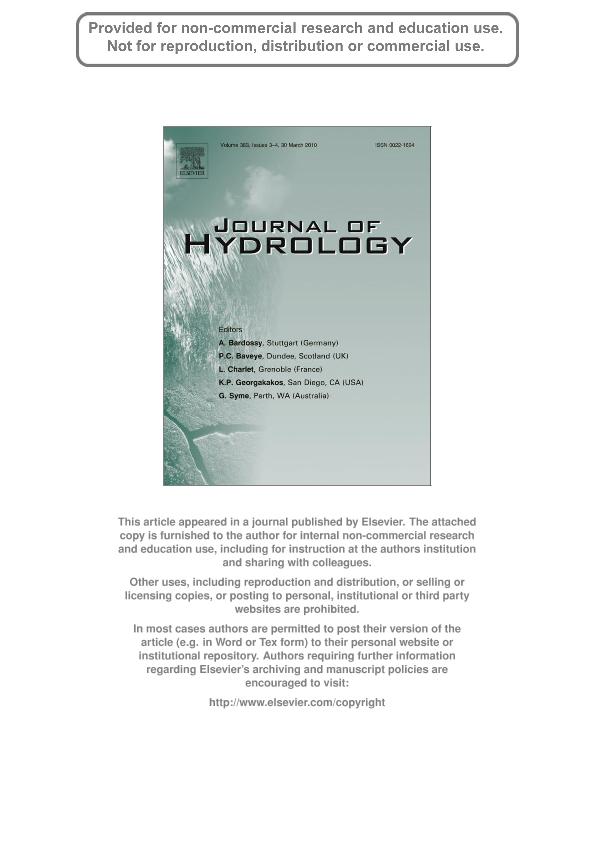Mostrar el registro sencillo del ítem
dc.contributor.author
Pasquini, Andrea Ines

dc.contributor.author
Depetris Gallino, Pedro Jose

dc.date.available
2018-08-14T14:23:39Z
dc.date.issued
2010-03
dc.identifier.citation
Pasquini, Andrea Ines; Depetris Gallino, Pedro Jose; ENSO-triggered exceptional flooding in the Paraná River: Where is the excess water coming from?; Elsevier Science; Journal Of Hydrology; 383; 3-4; 3-2010; 186-193
dc.identifier.issn
0022-1694
dc.identifier.uri
http://hdl.handle.net/11336/55339
dc.description.abstract
The Paraná River has been increasing its annual flow during the last ∼30 years. The relative contribution of its major tributaries (i.e., the upper Paraná and Paraguay rivers) is uneven in as much as the Paraguay is increasing its annual discharge at a higher pace than the upper Paraná does. Contrastingly, the upper Paraná has been increasing significantly its flow during the second half of the year (i.e., historical low water period) whereas the Paraguay River has been amplifying its flow throughout the hydrological year. The variability of δ 18O measured in the Paraná River middle reach tends to follow Paraguay's relative contribution to Paraná's total discharge. A simple model built on the basis of the mean δ 18O signature of rainfall (Global Network of Isotopes in Precipitation) shows significant coherency with the relative contribution time series during non-El Niño periods but it is necessary to invert the mean isotopic values in precipitation during the occurrence of a major ENSO event (i.e., assume that δ 18O in upper Paraná River water becomes more negative than usual) to improve the resemblance to the observed variability.
dc.format
application/pdf
dc.language.iso
eng
dc.publisher
Elsevier Science

dc.rights
info:eu-repo/semantics/openAccess
dc.rights.uri
https://creativecommons.org/licenses/by-nc-sa/2.5/ar/
dc.subject
Enso
dc.subject
Flood Sources
dc.subject
ParanÁ River
dc.subject
Spectral Analysis
dc.subject
Stable Isotopes
dc.subject
Trend Analysis
dc.subject.classification
Meteorología y Ciencias Atmosféricas

dc.subject.classification
Ciencias de la Tierra y relacionadas con el Medio Ambiente

dc.subject.classification
CIENCIAS NATURALES Y EXACTAS

dc.title
ENSO-triggered exceptional flooding in the Paraná River: Where is the excess water coming from?
dc.type
info:eu-repo/semantics/article
dc.type
info:ar-repo/semantics/artículo
dc.type
info:eu-repo/semantics/publishedVersion
dc.date.updated
2018-08-13T17:13:23Z
dc.journal.volume
383
dc.journal.number
3-4
dc.journal.pagination
186-193
dc.journal.pais
Países Bajos

dc.journal.ciudad
Amsterdam
dc.description.fil
Fil: Pasquini, Andrea Ines. Consejo Nacional de Investigaciones Científicas y Técnicas. Centro Científico Tecnológico Conicet - Córdoba. Centro de Investigaciones en Ciencias de la Tierra. Universidad Nacional de Córdoba. Facultad de Ciencias Exactas Físicas y Naturales. Centro de Investigaciones en Ciencias de la Tierra; Argentina
dc.description.fil
Fil: Depetris Gallino, Pedro Jose. Consejo Nacional de Investigaciones Científicas y Técnicas. Centro Científico Tecnológico Conicet - Córdoba. Centro de Investigaciones en Ciencias de la Tierra. Universidad Nacional de Córdoba. Facultad de Ciencias Exactas Físicas y Naturales. Centro de Investigaciones en Ciencias de la Tierra; Argentina
dc.journal.title
Journal Of Hydrology

dc.relation.alternativeid
info:eu-repo/semantics/altIdentifier/url/https://www.sciencedirect.com/science/article/pii/S0022169409008294
dc.relation.alternativeid
info:eu-repo/semantics/altIdentifier/doi/http://dx.doi.org/10.1016/j.jhydrol.2009.12.035
Archivos asociados
